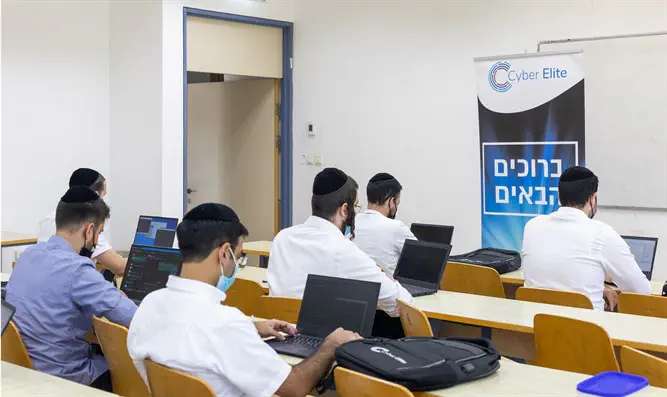This website uses cookies to ensure you get the best experience on our website. privacy policy and terms of use.

The Jerusalem College of Technology (JCT) – Lev Academic Center has launched Cyber Elite 2.0, which provides outstanding Orthodox and haredi graduates of software engineering and computer science degrees with intensive cyber security training while infusing Israel’s hi-tech and defense industries with a much-needed new source of highly skilled employees.
The pilot for Cyber Elite was created in the 2017-18 academic year in partnership with the Cyber Education Center, the National Cyber Directorate of the Prime Minister’s Office, and leading cyber companies to ensure that the training program responds to specific industry needs. The program trained and placed its 31 participants — 15 women and 16 men – in cyber security research and development positions in defense and commercial cyber companies.
During that pilot year, Cyber Elite students participated in Israel’s national Cyber Week competition. Among the 400 initial competitors, only 90 advanced to the final round. Twenty percent of them were from Cyber Elite, including the only women who made it to the final round. All the alums remain working in high-level hi-tech research and development positions today.
Based on the training and hands-on experience of the pilot, the skills of these Orthodox and haredi men and women surpassed what was expected. This success was also recognized by the Israel Innovation Authority, which affirmed the program’s significance by awarding JCT with a grant for two new Cyber Elite cohorts for the academic years of 2021-22 and 2022-23. Now, the program has a more advanced curriculum which includes topics such as malware analysis, penetration testing, network security, vulnerabilities and exploitations, and more, with training provided by industry experts and former military intelligence personnel.
The Cyber Elite 2.0 cohort will spend two days per week on JCT’s campuses for men (Machon Lev) and women (Machon Tal). For an additional three days each week, participants will work in research and development positions at 18 leading cyber security companies and cyber units of multinational companies, including Check Point, Cymotive, Intel, CYE, ARMO, Israel Aerospace Industries/Elta Systems, Rafael Advanced Defense Systems, Cellebrite and more.
The new cohort consists of 36 students — 19 men and 17 women — who are all from Orthodox and haredi backgrounds. They gained admission into the 10-month program among a group of hundreds of other potential applicants, following a rigorous screening process that included interviews with former military intelligence and team leaders in the cyber industry. The participants are now engaging with a curriculum developed in consultation with the defense and commercial cyber industries, which in turn will help its graduates become a new source of personnel at the highest level of the cyber security research and development sector.
“At its core, Israeli ingenuity is about best utilizing and amplifying the ideas and skills of the people of Israel,” said Orlee Guttman, Director of the Cyber Elite program. “We are thrilled that Cyber Elite will be able to provide the country with new, incredible talent that previously would never have had an entry into the cyber world. These men and women will bring major added value to the country's commercial and defense cyber industries.”
The primary path to senior positions in Israel’s cyber industry is participation in cyber units within the military. That makes the field virtually inaccessible to computer science and software engineering graduates from the haredi and National Religious communities, men and women, who are traditionally not represented in those army intelligence units. This ultimately means that Israel’s commercial and defense cyber sectors are missing out on outstanding engineers from across the religious community — but Cyber Elite is filling that void.
“Virtually all of my co-workers came through the IDF, people with many years of experience,” said Yechiel Levin. Levin grew up in the haredi school system, came to JCT with minimal knowledge in core subjects and worked hard to graduate with a computer science degree. He is a graduate of the Cyber Elite pilot and has been working as an engineer in the cyber industry ever since. He credits JCT and Cyber Elite for his success.
“I wouldn’t have been able to reach my current cyber security position through a regular job, no matter how talented and professional I am. The skills that we attained throughout the Cyber Elite program and the connections that we made with the industry enabled me to get to where I am today,” he explained.


Read JCT VP Doni Fogel's recent commentary in the Jerusalem Report.

The Board of Trustees, Executive Committee, Rabbis, faculty, graduates and...

The Jerusalem College of Technology is enormously excited to announce that Debra...